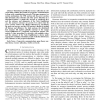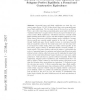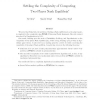109
click to vote
JUCS
2008
15 years 1 months ago
2008
: We present a distributed learning algorithm for optimizing transit prices in the inter-domain routing framework. We present a combined game theoretical and distributed algorithmi...
JSAC
2008
15 years 1 months ago
2008
We study in this paper a noncooperative approach for sharing resources of a common pool among users, wherein each user strives to maximize its own utility. The optimality notion is...
108
Voted
JSAC
2008
15 years 1 months ago
2008
Abstract--Distributed and efficient resource allocation is critical for fully realizing the benefits of cooperative communications in large scale communication networks. This paper...
127
Voted
JSAC
2008
15 years 1 months ago
2008
In this paper, we investigate the coverage problem in wireless sensor networks using a game theory method. We assume that nodes are randomly scattered in a sensor field and the goa...
114
click to vote
CORR
2007
Springer
15 years 1 months ago
2007
Springer
Abstract. Sequential game and Nash equilibrium are basic key concepts in game theory. In 1953, Kuhn showed that every sequential game has a Nash equilibrium. The two main steps of ...
CORR
2007
Springer
15 years 1 months ago
2007
Springer
We prove that Bimatrix, the problem of finding a Nash equilibrium in a two-player game, is complete for the complexity class PPAD (Polynomial Parity Argument, Directed version)
87
Voted
JAIR
2008
15 years 1 months ago
2008
Correlated equilibrium generalizes Nash equilibrium to allow correlation devices. Correlated equilibrium captures the idea that in many systems there exists a trusted administrato...
91
Voted
CN
2007
15 years 1 months ago
2007
In this paper we analyze a novel paradigm of reliable communication which is not based on the traditional timeout-andretransmit mechanism of TCP. Our approach, which we call Fount...
CORR
2008
Springer
15 years 1 months ago
2008
Springer
We present an experimental investigation of the performance of the Lemke-Howson algorithm, which is the most widely used algorithm for the computation of a Nash equilibrium for bi...
122
Voted
CORR
2008
Springer
15 years 1 months ago
2008
Springer
We develop a general game-theoretic framework for reasoning about strategic agents performing possibly costly computation. In this framework, many traditional game-theoretic resul...



